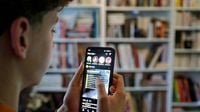In a bold move to address the growing concerns over screen addiction among the youth, Gabriel Attal, deputy of Hauts-de-Seine and general secretary of the Renaissance party, alongside child psychiatrist Marcel Rufo, has called for a "state of emergency against screens". Their proposals, outlined in a column published in Le Figaro on April 30, 2025, include stringent measures aimed at curbing the excessive use of social media and other digital platforms by minors.
The column comes in the wake of alarming statistics showing that adolescents spend between 3.5 to 5 hours a day in front of screens. Attal and Rufo argue that this excessive screen time is linked to rising mental health issues among young people, including anxiety, depression, and sleep disorders. They note that nearly half of 15-year-olds suffer from sleep disturbances, with a third waking up at night to check their phones.
Among the proposed measures is a ban on social media access for those under 15 years of age. They advocate for strict age verification processes akin to those used for adult content websites, ensuring that minors cannot create accounts on these platforms. Additionally, they suggest implementing a "digital curfew" for those aged 15 to 18, prohibiting access to social media from 10 PM to 8 AM. This curfew aims to protect young people during crucial sleep hours.
To further mitigate the effects of screen addiction, Attal and Rufo propose that social media platforms switch to black and white mode for at least one hour after 30 minutes of use, a tactic they believe will reduce the platforms' addictive appeal. Furthermore, they wish to limit daily social media usage to just one hour for minors, citing China’s regulations on TikTok as a model to emulate.
In their column, the authors also introduce the concept of an "addict-score"—a public rating system designed to assess the addictive potential of various applications and platforms, similar to the Nutri-score used for food products. This rating would help parents and guardians make informed decisions about the digital content their children engage with.
Moreover, they propose that 2% of the revenues generated by social media platforms in France be allocated to a fund dedicated to mental health research and care. This fund would support initiatives aimed at addressing the psychological impacts of screen addiction on young people.
Attal and Rufo's proposals echo sentiments expressed in a report titled "Enfants et écrans" commissioned by President Emmanuel Macron a year prior, which highlighted the urgent need for intervention in the face of escalating mental health crises among youth.
In their call to action, the authors assert, "If we do nothing, screens and their content will slowly kill our youth and, ultimately, our society as a whole." This alarming statement underscores the seriousness with which they view the issue, framing it as a "cataclysmic health crisis" that requires immediate and radical solutions.
While their suggestions have sparked considerable debate, some experts caution against labeling screen time as an addiction. The American Psychiatric Association (APA) does not officially recognize social media addiction as a mental health disorder in its Diagnostic and Statistical Manual of Mental Disorders (DSM). This has led to discussions about the appropriateness of the term "addiction" in this context, with some researchers advocating for a more nuanced understanding of the relationship between youth and screens.
Critics of the proposed measures argue that while the intentions may be noble, the implementation raises significant questions. How can such sweeping regulations be enforced in a democratic society? What about the role of parents in managing their children’s screen time? Furthermore, some suggest that rather than imposing restrictions, there should be a focus on promoting healthy digital habits and providing alternative activities that engage young people outside of screens.
In a broader context, the discussion around screen time and youth mental health is not unique to France. Countries like Australia have also taken steps to restrict social media access for younger users, reflecting a growing global concern over the impact of digital consumption on mental well-being.
As the debate unfolds, it remains to be seen how Attal and Rufo's proposals will be received by policymakers, parents, and the tech industry. The conversation about screen time, mental health, and youth is far from over, and it highlights the urgent need for a balanced approach that considers the complexities of digital engagement in the lives of young people.



